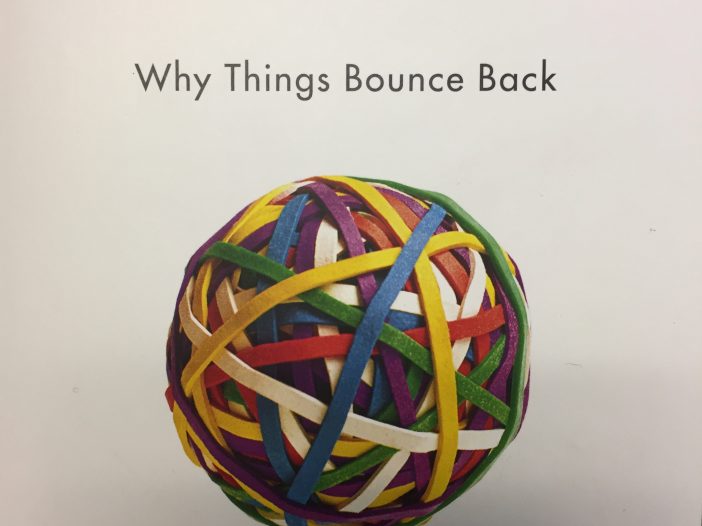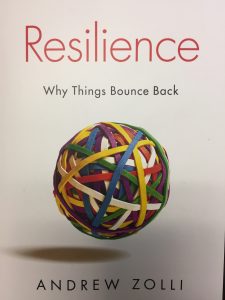
We are living in uncertain times with many industries and systems being disrupted. All of these changes are potential cause for us to perceive numerous stressors. This post builds on my previous blog posts about how to become resilient.
Resiliency and how to become more resilient has become a hot topic these days. Since we are living and working in times of an accelerated pace of change hitting us from all directions, it is helpful to have information on how to navigate these changes in order to stay calm and move forward.
Last week I had the opportunity to hear Andrew Zolli, co-author of the book Resilience: Why Things Bounce Back. He reminded the audience we are living in complicated times where the rules and policies have been disrupted. Since transitions are uncomfortable for most of us, leaders need to understand change in order to help others “through the fog.” He stressed how we need to the skills to “persist, recover, and flourish” in continued disruption.
Zolli said that resilience is not robustness, not redundancy, and not resources. Interestingly, his comments could be applied as individuals, communities, and societies. He identified four main building blocks of resilience:
- Build regenerative capacity (Building). Keep the system healthy. As in a body, cells turn over every seven years, but we have to stay healthy for the system to be creative, diverse, and healthy to accept change.
- Listen for change (Sensing). Pay attention to the emerging risks. This is a form of capacity building.
- Respond to disruption (Responding). Most responses are not planned. Be prepared to collaborate through relationships of trust. Adhocracy: adaptive, creative, informal response to change. He compared this to pick-up basketball or jazz. Plan for the context of emergence. But build the bonds of trust before you need them in order to work together to take action.
- Transformation (Learning). Hold on or let go. Take action to make something happen.
According to Zolli, there are connections among the four elements again similar to the cells in a body that are always working and interacting. He said “resilience is not something we unlock, but something we possess” and we need to build the capacity.
Zolli provided all kinds of examples, data, and stories of why some people and communities seem to be more resilient than others. One fact was how many older people tend to be more resilient than younger people because they have learned the tools to regulate their emotions. He called one tool “narrative openness” where they tend to realize the “story is not over.” They can also hold opposite beliefs at the same time so they don’t tend to be so black and white about the world.
Another interesting fact was how important the “team” is or the “tribe.” Basically Zolli emphasized the value of trusting relationships and how much help and support exists for you and/or your community. A key to becoming resilient is to surround yourself with people you trust whom would help you when needed. While family is important, I believe our tribe needs to be bigger so that we don’t put too much pressure and expectations on family members.
We need support outside of family and that can be found in places such as from involvement in organizations, faith communities, and volunteer work. But this takes some time and commitment to build these relationships. Trusting relationships don’t happen overnight or by “magic.” Being intentional and having the mindset of a servant leader helps. It takes non-zero sum game thinking, but a sense of humility and future orientation realizing we are all in the same boat. And a rising tide raises all boats.
I was reminded of this quote by Esther Perel:
“The quality of our relationships is what determines the quality of our lives.”
Who is in your “tribe?”
How prepared are you for the changes now and in the future?
How are you building the capacity to bounce back?
How well is your community doing in these areas?
 Sign Up and Download Your FREE Copy of The Top 5 Actions For Creating Your Own Breadcrumb Legacy™
Sign Up and Download Your FREE Copy of The Top 5 Actions For Creating Your Own Breadcrumb Legacy™

